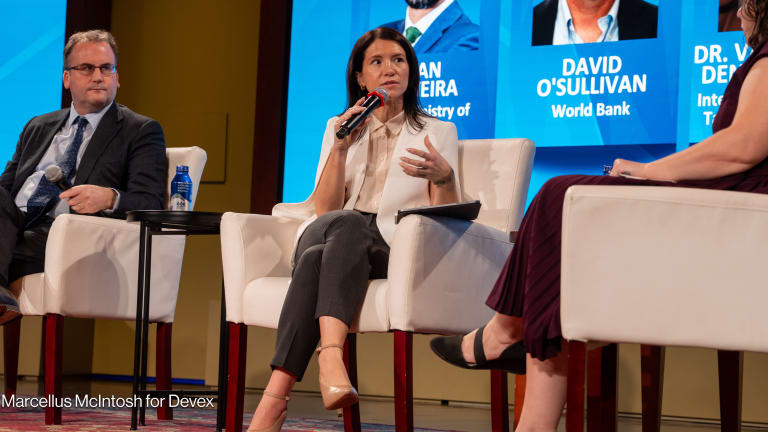
DUBAI, United Arab Emirates — The draft version of the Dubai Declaration, released on day one of the United Nations World Data Forum, has set the stage for three days of discussion on the role of data in meeting the Sustainable Development Goals.
Reinforcing the implementation of the Cape Town Global Action Plan, the Dubai Declaration highlights a message that has already been heard frequently during the conference — the importance of building capacity to create and utilize quality data.
Devex Data Guardians series:
► Is data consent in humanitarian contexts too much to ask?
► Scarcity of data protection laws in Africa leaves NGOs exposed
► The two big problems with SDG data
► With new Tableau partnership, UN looks to modernize data sharing
Now open for comment, the declaration calls for the establishment of an innovative funding mechanism that can support countries in improving their national data and statistical systems. The goals is to “mobilize both domestic and international funds, and activate partnerships and funding opportunities” to strengthen the capacity of national data and statistical systems.
The funding mechanism will be driven by country needs and will be created in the mandate of the U.N. Statistical Commission, with help from statistics experts and donor communities.
Member countries have been asked to commit to mobilizing their own resources and delivering quality administrative data. Countries will be asked to support the 2020 world population and housing census to improve the baseline of data and move it forward.
At the opening press conference on Sunday, U.N. Statistics Division Director Stefan Schweinfest acknowledged the challenge, telling media he had returned from a meeting of Asia-Pacific statisticians where some countries had only two or three people supporting an entire national statistics program — it highlighted why the new funding mechanism was critical.
The declaration highlights that it is not just the ability to hold data, but to update it frequently for analysis over time. It is also crucial that data can identify populations at risk — both demographically and geographically — within nations’ borders, and that this data facilitates the visibility of those commonly invisible in data — such as women, girls, and people with disability. A priority for the declaration, which will be officially delivered on Wednesday.
The declaration also calls for the better use of administrative data, to ensure that the investment results in better policies and programs to support those most vulnerable.
Discussion, negotiations, and collaboration
The three official days of the U.N. World Data Forum are enhanced by data meetings and bilateral sessions occurring around the official days.
The forum itself will have a variety of data discussion as part of 80 sessions — filtered down from 500 submitted sessions, demonstrating the importance of data to U.N. member countries.
Abdullah Nasser Lootah, director-general of the United Arab Emirates Federal Competitiveness and Statistics Authority, said that meetings began Friday, with bilaterals between a number of countries.
The first included high-level memorandum of understanding signed between UAE and France, international enterprises, as well as local organizations. The UAE agreement with France facilitates the sharing of knowledge on artificial intelligence. Lootah said UAE’s memorandums with local organizations include agreements to encourage youth to get involved in data to support the Sustainable Development Goals. The importance, he explained, was for these agreements to help make data relevant and actionable.
Data groups used days around the events to meet and discuss data challenges further, such as the UN Global Working Group on Big Data, and a number of other events on the challenges — and potential solutions — to communicating data broadly.
Focus on capacity building
Beyond the discussions, negotiations, and agreements, was the work of bringing together global data experts to improve data supporting the SDGs. Improving data collection methods, including the quality of use of data, was an important theme for day one, reiterating the themes of the declaration.
The options and solutions available to build capacity were diverse.
In a session focusing on The Data Revolution: AI for Sustainable Development, Executive Director of DataKind Jake Porway spoke about artificial intelligence as part of the data process.
Monitoring novel data sources — such as building in a satellite image, optimizing resource allocations, predicting future states, automating laborious and time-consuming tasks, and finding hidden trends and anomalies are areas in which AI could support decision-making. Raising the question of whether this would create a gap between the data have and have-nots.
Questions from the audience reflected the desire for regulation before relying on technology to solve issues. With the UNSD looking at ways to better support countries, including those with limited capacity to support national statistical sessions, it was an important session to highlight opportunities to enhance local capabilities.
Capacity building was also a reason for Data4SDGs to launch a new guide at the forum to support countries in making data interoperable — enabling data consistency across countries and themes — that enable analyses to see patterns, trends, and gaps. Oversight and accountability, roadmaps, data and metadata models, standard classifications and vocabularies, open data formats, and data linking, are all in the new guide.
Discussions also focused on collaboration and fostering a better culture of sharing capacity, with a number of sessions and speakers encouraging diversity in collaboration — including with researchers, humanitarian sectors, and the private sector.
Speakers considered leveraging new knowledge, capability, and capacity critical to truly deliver on the SDGs by 2030 — with deadlines fast approaching.
Lisa Cornish attended the U.N. World Data Forum as a Data2X press fellow.








